Speaker: dr Tomasz Turowski, IBB PAN, Warszawa
Talk: "Modelling of SARS-CoV-2 infection as a tool to reveal new viral mechanisms"
Time: 10.06.2022, 9:00 am
Venue: Intercollegiate Faculty of Biotechnology, Abrahama 58, hall 042
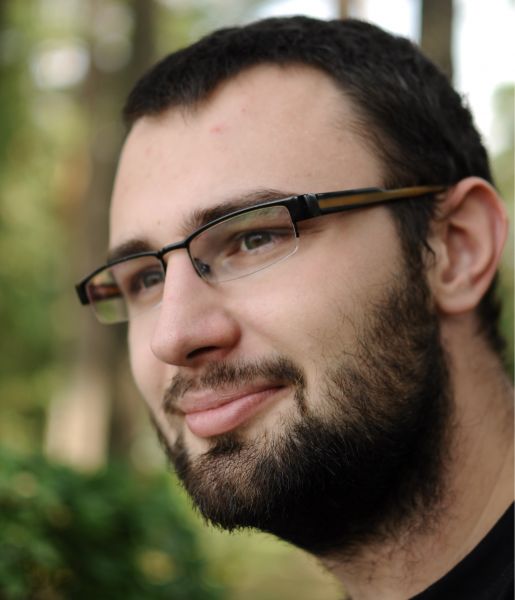
Dr. Tomasz Turowski holds a Master Degree in Molecular Biology (from Nicolaus Copernicus University in Torun). In 2013 he was awarded his PhD in Chemistry at the Warsaw University of Technology (Institute of Biotechnology), working on coupling between tRNA transcription and decay under the supervision of Prof. Magdalena Rakowska-Boguta. He carried out his postdoctoral training at the Wellcome Centre for Cell Biology at the University of Edinburgh (Scotland, UK) in the group of Prof. David Tollervey. During this time, he got interested in biochemistry and bioinformatics. Tomasz’s research interests include transcription elongation of RNA polymerase I and III, which are relatively unique transcription systems in higher organisms. During the SARS-CoV-2 pandemic he participated in a collaborative effort to characterize SARS-CoV-2 host-virus interactions during viral infection. His recent work combines an interdisciplinary approach utilising UV cross-linking in vivo, bioinformatics and mathematical modelling. Tomasz was awarded a Polish Return grant funded by NAWA and in August 2021 started his own group at the Institute of Biochemistry and Biophysics Polish Academy of Sciences in Warsaw. The Laboratory of Transcription Mechanisms headed by Dr. Turowski is interested in understanding how the transcription affects gene regulation. They apply basic knowledge to problems such as SARS-CoV-2 transcription and RNA polymerase III-related leukodystrophy.
Speaker: dr Jorge Bernardino De La Serna, Faculty of Medicine, National Heart & Lung Institute, Imperial College London
Talk: "Functional Lipid liquid-liquid immiscibility at immune interfacial barriers"
Time: 27.05.2022, 9:00 am
Venue: Intercollegiate Faculty of Biotechnology, Abrahama 58, hall 042
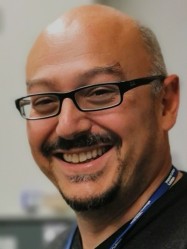
Dr Bernardino de la Serna holds two Master Degrees, one in Chemistry and another in Biochemistry (from University Complutense of Madrid (Spain). He was awarded his PhD at the working in the Department of Biochemistry and Molecular Biology under the supervision of Prof. Perez-Gil.
He carried out his postdoctoral training at the Center for BioMembrane Physics (MEMPHYS) at the University of Southern Denmark. In 2014 Jorge was awarded Marie Skłodowska-Curie Career Integration Fellowship and moved to the University of Oxford (United Kingdom). There he was based at the MRC-Weatherall Institute of Molecular Medicine, Nuffield Department of Medicine, in the group of Prof. Christian Eggeling. During this time he got interested in super resolution imaging and undertook additional training in super-resolution fluorescence microscopy at the lab of Nobel Prize Laureate Prof. Stephan Hell at the Max Planck Institute for Biophysical Chemistry, Göttingen (Germany). Thereafter, he moved to the Oxford-Harwell Campus to undertake a new role of a Staff Scientist at the United Kingdom Research and Innovation (UKRI), working at the Central Laser Facility at the Rutherford Appleton Laboratory. In 2019 Jorge joined the National Heart and Lung Institute, Imperial College London (United Kingdom) as a Senior Lecturer. His academic career also includes additional research stays, e.g. fellowship at the Humboldt University in Berlin and stays at the University of California at Santa Barbara, Venezuelan Institute for Scientific Investigations (IVIC) in Caracas Venezuela, SENAI/CETIQT in Rio de Janeiro, Brazila and Umeå University in Sweden.
Jorge’s interests include research on molecular sensing and remodeling in the airways, interactions between host cell and toxic pollutants, nanoparticles and pathogens, engineered nanoparticles as drug delivery systems, organ-on-a-chip models and advanced imaging techniques, incl. super-resolution (STED) fluorescence microscopy.
Speaker: prof. Susanne Gabrielsson, Karolinska Institutet, Department of Medicine Clinical Allergy Research Unit, Solna, Sweden
Talk: "Immune modulatory extracellular vesicles: applications as biomarkers and for clinical treatment"
Time: 06.05.2022, 9:00 am
Venue: Intercollegiate Faculty of Biotechnology, Abrahama 58, hall 042
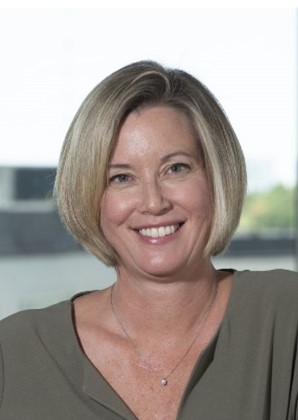
Prof. Gabrielsson graduated with a PhD from Stockholm University. She then moved to France for as a postdoc at the Curie Institute in Paris, developing interest in dendritic cells and T cell responses. After this, she returned to Sweden and established a group dedicated to exosome research at the Karolinska Institutet. Susanne has been a pioneer in the field of immune effects of exosomes and she is one of the leading authors of the field having published 37 articles on the subject.
She was the first to describe the presence of exosomes in bronchoalveolar lavage fluid, as well as in breast milk. Her work has revealed that exosomes are major players in lung diseases such as asthma and sarcoidosis, where they contribute to inflammation. Professor Gabriellson lab carries out studies in animal models to give new insights into the role of exosomes in cancer progression. She also has a major interest in exosome-based therapies for immunotherapeutic applications or biomarkers in cancer.
Speaker: Sergey Samsonov
Talk: "Modeling protein-glycosaminoglycan interactions in biologically relevant systems"
Time: 08.04.2022, 9:00 am
Venue: Online and Live in the "IFB seminars" group of MS Teams. Group password: ypidr3d
.jpg) Sergey Samsonov graduated in Biophysics at Peter the Great St. Petersburg Polytechnic University in 2006. He obtained his first PhD in 2009 in Bioinformatics at the Dresden University of Technology, where he investigated the impact of solvent and effects of fluorination in protein-protein interactions. In 2010 he obtained his second PhD title in the field of Biochemistry at St. Petersburg University for the continuation of his Master Thesis topic on copper metabolism proteins. Since then and until 2017 he was a postdoctoral researcher in the group of Structural Bioinformatics at Dresden University of Technology within the project “Transregio 67: Functional biomaterials for controlling healing processes in bone and skin tissue – from material to clinic”, where he started to work in the field of modelling glycosaminoglycans (GAG) containing biomolecular systems. In 2017 he received a joint grant from National Centre of Sciences (Poland) and EU Commission within POLONEZ Programme to start his own research group at the University of Gdańsk. In 2018 he obtained the title of dr hab. at the University of Tours (France) (Habilitation à diriger des recherches). In 2019, he received two new grants from National Centre of Sciences (Poland), one of which is within collaborative Programme with German Research Council, both of which represent the extension of his GAG modeling studies. His research interests are in approaching the understanding of various aspects of GAG interactions with other biomacromolecules and development of specific methodology for this class of polysaccharides with the assistance of molecular docking, molecular dynamics, free energy calculations and quantum chemistry approaches.
Sergey Samsonov graduated in Biophysics at Peter the Great St. Petersburg Polytechnic University in 2006. He obtained his first PhD in 2009 in Bioinformatics at the Dresden University of Technology, where he investigated the impact of solvent and effects of fluorination in protein-protein interactions. In 2010 he obtained his second PhD title in the field of Biochemistry at St. Petersburg University for the continuation of his Master Thesis topic on copper metabolism proteins. Since then and until 2017 he was a postdoctoral researcher in the group of Structural Bioinformatics at Dresden University of Technology within the project “Transregio 67: Functional biomaterials for controlling healing processes in bone and skin tissue – from material to clinic”, where he started to work in the field of modelling glycosaminoglycans (GAG) containing biomolecular systems. In 2017 he received a joint grant from National Centre of Sciences (Poland) and EU Commission within POLONEZ Programme to start his own research group at the University of Gdańsk. In 2018 he obtained the title of dr hab. at the University of Tours (France) (Habilitation à diriger des recherches). In 2019, he received two new grants from National Centre of Sciences (Poland), one of which is within collaborative Programme with German Research Council, both of which represent the extension of his GAG modeling studies. His research interests are in approaching the understanding of various aspects of GAG interactions with other biomacromolecules and development of specific methodology for this class of polysaccharides with the assistance of molecular docking, molecular dynamics, free energy calculations and quantum chemistry approaches.
Speaker: Elvin Flamingo and Xavier Bailly
Talk: "Symsagittifera roscoffensis as a main Actor* of The Plant~Animals ~ Symbiosity of Creation"
Time: 11.03.2022, 9:00 am
Venue: Online in the "IFB seminars" group of MS Teams. Group password: ypidr3d
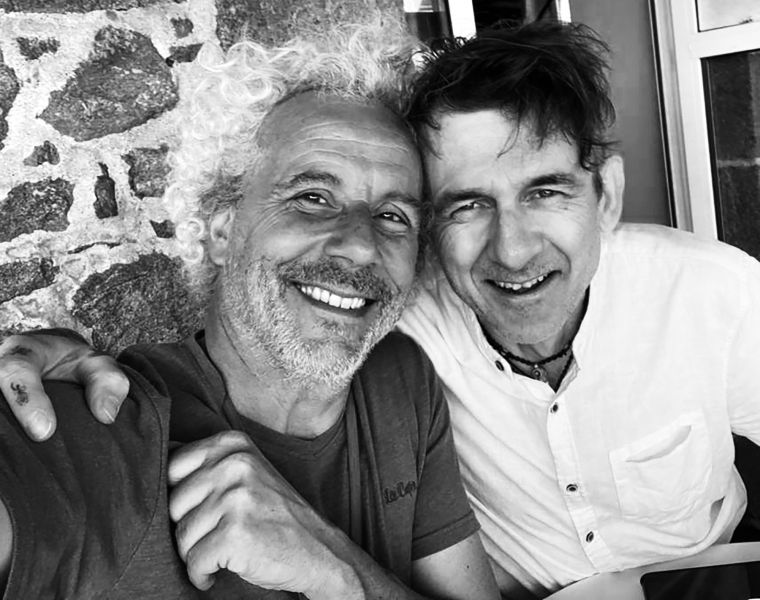 Elvin Flamingo is an artist working in the fields of Bioart and Art&Science. His projects combine art, biology, and technology. His most important project, thus far, is The Symbiosity of Creation, which was the topic of his doctoral thesis. It began in 2012 and is planned to continue to 2034. The work's point of departure is the cultivation of exotic ants. It consists of three parts invoking the themes of destruction and re-creation. The Symbiosity of Creaton received broad national and international coverage and was presented at various exhibitions, including Kunsthal Aarhus in Denmark, at the Art&Science Convesations seminar in Kassel, Germany, and at TEDx Between Genres exhibition in Gdynia. It received the Critic's Award at the Media Art Biennale WRO: Test Exposure, Wrocław, Poland, in 2015.
Elvin Flamingo is an artist working in the fields of Bioart and Art&Science. His projects combine art, biology, and technology. His most important project, thus far, is The Symbiosity of Creation, which was the topic of his doctoral thesis. It began in 2012 and is planned to continue to 2034. The work's point of departure is the cultivation of exotic ants. It consists of three parts invoking the themes of destruction and re-creation. The Symbiosity of Creaton received broad national and international coverage and was presented at various exhibitions, including Kunsthal Aarhus in Denmark, at the Art&Science Convesations seminar in Kassel, Germany, and at TEDx Between Genres exhibition in Gdynia. It received the Critic's Award at the Media Art Biennale WRO: Test Exposure, Wrocław, Poland, in 2015.
The Symbiosity of Creation is a manifesto, which involves — among others — the following points:
• The Symbiosity of Creation is a change in the position of the author from demiurge to participant.
• SC is a shared creation conducted with utter devotion full respect for all participating beings.
• SC lacks the possibility of creating only for the time of exhibition — it is necessary to foresee carefully the future of the work.
• SC is a process in which everything has meaning, both the decisions of the human-artist and the non-humans participating in the process — the decisions of both parties have a creative influence on one and other, and it does not matter which decisions are more important.
Other important works of Elvin Flamingo include • The Language of Stray Bodies, • Self Cells Portrait, • New-Bio-Territories, • We—The Common Body, • After Humans, the Biocorporation, • Reconstruction of Non-human Culture.
In 2021 Elvin Flamingo started to work on Plant~Animals ~ Symbiosity of Creation in cooperation with Xavier Bailly Ph.D, which premiered at the program of Ars Electronica, Linz, Austria in 2021.
Elvin Flamingo (prof. ASP dr hab. Jarosław Czarnecki) is also lecturer at the Faculty of Sculpture and Intermedia of the Academy of Fine Arts in Gdańsk, Poland and was the Associate Dean of Intermedia (2016-2019).
* the Actor corresponds with the ANT (Actor Network Theory) by Bruno Latour
Speaker: dr Wojciech Siwek, Harvard Medical School, USA, ICCVS, University of Gdańsk
Talk: "Transcriptional memory of interferon gamma target genes"
Time: 25.02.2022, 2:00 pm
Venue: Online in the "IFB seminars" group of MS Teams. Group password: ypidr3d.
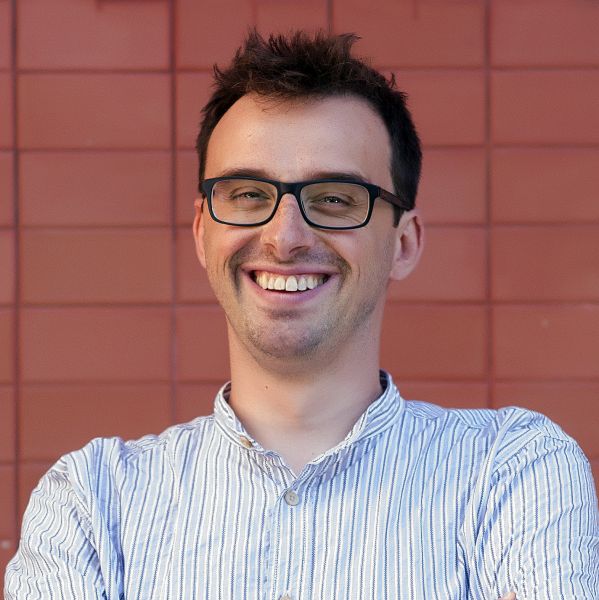 Dr Wojciech Siwek graduated from the University of Warsaw. He did his PhD at the International Institute of Molecular and Cell Biology, Warsaw followed by two postdocs at Instituto Gulbenkian de Ciência, Lisbon, Portugal & Department of Biochemistry, University of Oxford, UK. Currently, he is an independent Marie Skłodowska-Curie research fellow at Massachusetts General Hospital, Harvard Medical School, Boston, USA & International Centre for Cancer Vaccine Science, University of Gdańsk. Dr Siwek is interested in epigenetic mechanisms in innate immunity and transcriptional memory.
Dr Wojciech Siwek graduated from the University of Warsaw. He did his PhD at the International Institute of Molecular and Cell Biology, Warsaw followed by two postdocs at Instituto Gulbenkian de Ciência, Lisbon, Portugal & Department of Biochemistry, University of Oxford, UK. Currently, he is an independent Marie Skłodowska-Curie research fellow at Massachusetts General Hospital, Harvard Medical School, Boston, USA & International Centre for Cancer Vaccine Science, University of Gdańsk. Dr Siwek is interested in epigenetic mechanisms in innate immunity and transcriptional memory.
Speaker: dr Daniel Puleston, Johns Hopkins University - US
Talk: "Metabolic control of helper T cell lineage selection"
Time: 03/12/2021, 2:00 pm
Venue: Intercollegiate Faculty of Biotechnology, Abrahama 58, hall 042
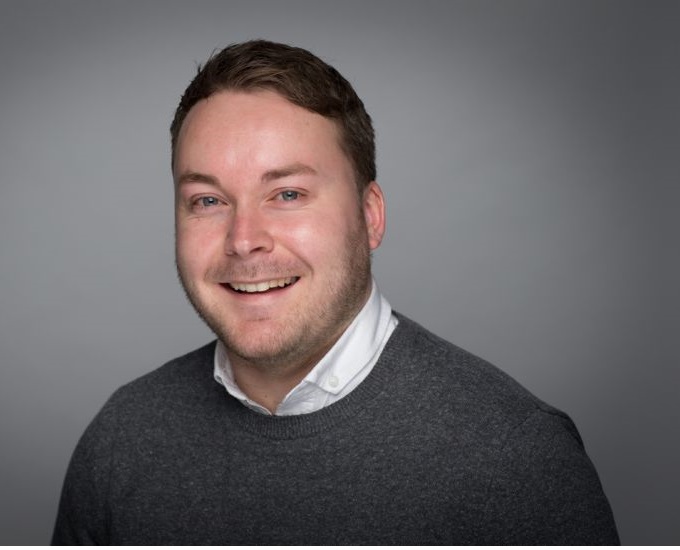 Dan graduated with a bachelor degree from the University of Plymouth (UK) and then followed with a master degree in Integrated Immunology at the University of Oxford. He continued there in the lab of Prof. Katja Simon where he did his PhD, investigating the role of autophagy in T cells. He then moved to Germany for a postdoc at the Max Planck Institute for Immunobiology & Epigenetics in Freiburg where he joined the lab of the Prof. Erika Pearce, the Institute Director, to carry out research in immunemetabolism. Currently, since May 2021, Dan is based at Johns Hopkins University in Baltimore, at the The Sidney Kimmel Comprehensive Cancer Centre.
Dan graduated with a bachelor degree from the University of Plymouth (UK) and then followed with a master degree in Integrated Immunology at the University of Oxford. He continued there in the lab of Prof. Katja Simon where he did his PhD, investigating the role of autophagy in T cells. He then moved to Germany for a postdoc at the Max Planck Institute for Immunobiology & Epigenetics in Freiburg where he joined the lab of the Prof. Erika Pearce, the Institute Director, to carry out research in immunemetabolism. Currently, since May 2021, Dan is based at Johns Hopkins University in Baltimore, at the The Sidney Kimmel Comprehensive Cancer Centre.
Dan has a fantastic track record of important awards, including multiple scholarships from the Colleges of the University of Oxford, The Ita Askonas Medal for research in immunology, EMBO post-doctoral fellowship and very prestigious Sir Henry Wellcome Post-Doctoral Fellowship awarded by The Wellcome Trust, to name a few.
Dan has an even more impressive publication record, having published in the highest-ranked journals, incl. Nature Immunology, Nature Metabolism, Cell Metabolism, Cell Host & Microbe, PNAS, Journal of Clinical Investigation and Autophagy. Recently, his first-author research article appeared in Cell. Apart from this, Dan has two patents resulting from his work in the topic of immune modulation, he was also a secretary of the Oxford Immunology Group, and acted as a Guest Associated Editor for Frontiers in Immunology. Finally, he is also involved in the admission process for the Integrated Immunology programme at the University of Oxford.
Speaker: prof. Alessio Mengoni, University of Florence, Italy
Talc: "Legume tasters: The panoply of symbiotic rhizobia host preference"
Time: 17/12/2021, 9:00 am
Venue: Intercollegiate Faculty of Biotechnology, Abrahama 58, hall 042
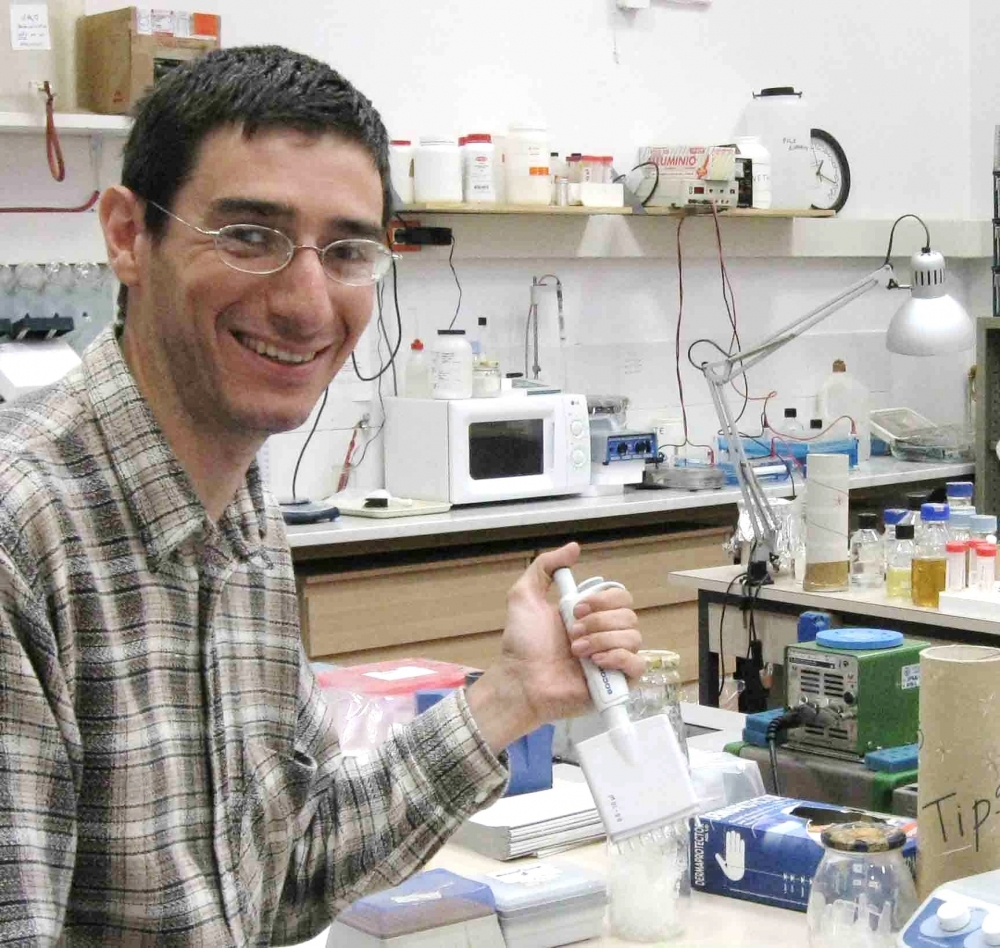 Bio: Alessio Mengoni graduated in biological sciences in 1997 and obtained a PhD in genetics from the University of Pavia in 2000. He is associate professor of Genetics, qualified as full professor, at the Department of Biology of the University of Florence and has been visiting professor at the Intercollegiate Faculty of Biotechnology MUIG & GU, Gdansk, Poland and at the School of Sun-Yat Sen University, Guangzhou, China. He holds courses in genetics, genetic engineering, genomics and systems biology in the degree programs in Biotechnology and Biology. Main research interests deal with the study of interactions between plants and microorganisms, in particular related to plant growth-promoting bacteria and plant microbiome for applications in agricultural and environmental biotechnology. He is the author of over 170 scientific articles, a patent and founding partner of a spin-off company of the University of Florence for microbiological and genetic analysis (EcolGene Srl). Bibliometric indices: h index = 37, 4105 total citations (Scopus database, October 2021). He has been PI and partner in the last 5 years of various national and international projects, including a Italian Ministry of Agriculture funded project on bioinoculants (MICRO4Legumes), a project on microbial genomic diversity of the National Research Plan in Antarctica (ANTreN), a soil metagenomics project (METATRACK, CR Firenze Foundation), a project on the microbiome of patients affected by Cystic Fibrosis (Italian Cystic Fibrosis Research Foundation), and two H2020 projects on plant bioinoculants (SIMBA) and International Space Station microbiota (BIOWYSE).
Bio: Alessio Mengoni graduated in biological sciences in 1997 and obtained a PhD in genetics from the University of Pavia in 2000. He is associate professor of Genetics, qualified as full professor, at the Department of Biology of the University of Florence and has been visiting professor at the Intercollegiate Faculty of Biotechnology MUIG & GU, Gdansk, Poland and at the School of Sun-Yat Sen University, Guangzhou, China. He holds courses in genetics, genetic engineering, genomics and systems biology in the degree programs in Biotechnology and Biology. Main research interests deal with the study of interactions between plants and microorganisms, in particular related to plant growth-promoting bacteria and plant microbiome for applications in agricultural and environmental biotechnology. He is the author of over 170 scientific articles, a patent and founding partner of a spin-off company of the University of Florence for microbiological and genetic analysis (EcolGene Srl). Bibliometric indices: h index = 37, 4105 total citations (Scopus database, October 2021). He has been PI and partner in the last 5 years of various national and international projects, including a Italian Ministry of Agriculture funded project on bioinoculants (MICRO4Legumes), a project on microbial genomic diversity of the National Research Plan in Antarctica (ANTreN), a soil metagenomics project (METATRACK, CR Firenze Foundation), a project on the microbiome of patients affected by Cystic Fibrosis (Italian Cystic Fibrosis Research Foundation), and two H2020 projects on plant bioinoculants (SIMBA) and International Space Station microbiota (BIOWYSE).
Abstract . Mutualistic interactions have great importance in biology and are key to either macro- and micro-ecosystems functioning, from biogeochemical cycles to the animal and plant microbiome. Many studies have been performed to investigate the molecular aspects of mutualism, however, the genetic repertoire needed for efficient association with host by the microbial symbionts is still poorly understood. Several studies highlighted that the expression of the desired phenotype in the host resides in species-specific, even genotype-specific interactions between the symbiotic partners. Consequently, there is a need to dissect such an intimate level of interaction, aiming to identify the main genetic components in both partners playing a role in symbiotic differences/host preferences [1]. The rhizobia are an exemplary model of microbial mutualist. They are facultative mutualist partners of leguminous plants, with which they establish nitrogen-fixing symbioses.
By applying complementary approaches spanning from computational reconstruction of metabolic interactions to transcriptomic and comparative genomic analyses, we dissected genotype-by-genotype interactions in the model symbiotic partnership between the rhizobium Sinorhizobium meliloti and the host plant (Medicago spp.).
Results from integrated rhizobium-plant genome-scale metabolic model [2], genome-wide association [3] and comparative transcriptomic analyses [4] of late and early stages of symbiosis will be presented and discussed in the light of explaining and exploiting the large genomic diversity rhizobial symbiont populations in the perspective of improving microbial inoculants formulations in sustainable agriculture practices.
Speaker: Dr Sebastian Lewandowski
Talk: "On Brains and Vessels: How perivascular fibroblasts contribute to ALS neurodegeneration"
Time: 15.10.2021, 9:00 am
Venue: Intercollegiate Faculty of Biotechnology, Abrahama 58, hall 042
 Bio: Dr Lewandowski’s research aims to explain the interdependence between the neuronal and vascular cells. His recent work has shown that brain vascular fibroblasts are activated before the onset of neuroinflammation and neurodegeneration in ALS (Månberg et al 2021). His future studies in ALS could help to redefine the mechanisms of ALS etiology, clinical prognosis and therapy. Dr Lewandowski is a member of the Swedish Medical Association, Swedish Society for Neuroscience and a steering group member of the junior faculty at the Karolinska Institute. He has received grants for his ALS research from the Ulla-Carin Lindquist Foundation, the Åhlens Foundation, and the Olle Engkvist Byggmästare Foundation. He received his undergraduate degree from the University of Gdansk and obtained his PhD in molecular biology from the Nencki Institute of Experimental Biology in Warsaw. He performed his postdoctoral training at laboratory of Prof. Ulf Eriksson at the Karolinska Institute.
Bio: Dr Lewandowski’s research aims to explain the interdependence between the neuronal and vascular cells. His recent work has shown that brain vascular fibroblasts are activated before the onset of neuroinflammation and neurodegeneration in ALS (Månberg et al 2021). His future studies in ALS could help to redefine the mechanisms of ALS etiology, clinical prognosis and therapy. Dr Lewandowski is a member of the Swedish Medical Association, Swedish Society for Neuroscience and a steering group member of the junior faculty at the Karolinska Institute. He has received grants for his ALS research from the Ulla-Carin Lindquist Foundation, the Åhlens Foundation, and the Olle Engkvist Byggmästare Foundation. He received his undergraduate degree from the University of Gdansk and obtained his PhD in molecular biology from the Nencki Institute of Experimental Biology in Warsaw. He performed his postdoctoral training at laboratory of Prof. Ulf Eriksson at the Karolinska Institute.
Abstract. Although the core symptoms of ALS feature rapid, degeneration of motor neurons, we still know little how other cells including blood vessels contribute to ALS etiology. Our work shows that cerebral perivascular fibroblast cells become active long before the onset of neuroinflammation and remodel perivascular spaces with specific collagen and chemokine proteins in ALS mouse models and sporadic ALS patients (Månberg et al. Nature Medicine 2021). Targeted plasma proteomics of 452 ALS patients showed that perivascular fibroblast specific proteins increase vastly outperforms current standards of prediction for patient survival. We believe our results provide a novel conceptual framework to re-evaluate cellular contributions to etiology and dynamics of ALS neurodegeneration. Since enlarged perivascular spaces are repeatedly observed in aging, dementia and other neurological disorders, perivascular fibroblast cell activity could represent a common mechanism in cerebral injury response.
Speaker: Dr Sachin Kote
Talk: "Neoantigen discovery & proteomics development at International Centre for Cancer Vaccine Science"
Time: 11.06.2021, 9:00 am
Venue: Online in the "IFB seminars" group of MsTeams. Group password: ypidr3d.
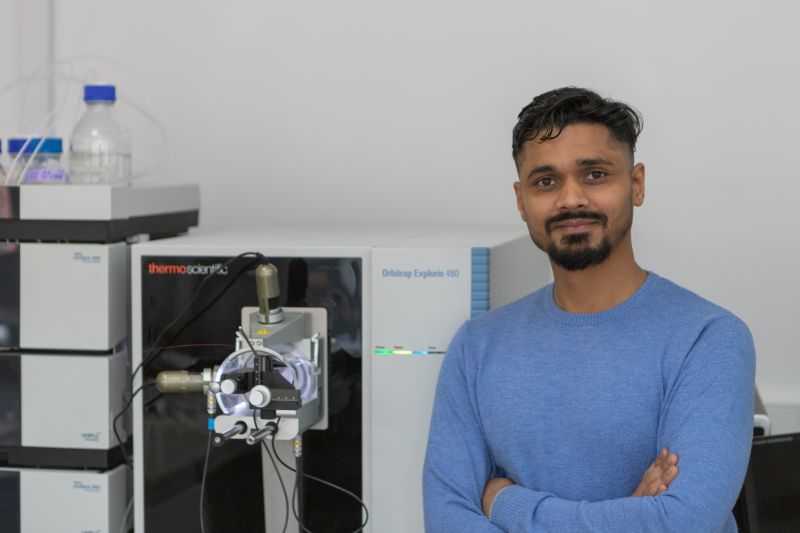
I am acting team leader of the chemical biology group at the International Centre for Cancer Vaccine Science (ICCVS). I am currently leading the neoantigen discovery/immunopeptidomics projects and proteomics development at ICCVS, University of Gdansk, Poland (www.iccvs.ug.edu.pl) since 2018.
I have specialized in peptidomics, proteomics, and cancer vaccine science. I have been working in the field of proteomics concerning health, environment, and safety for the past 12 years. I started my research career as a research project assistant in the proteomics laboratory at the National Chemical Laboratory (NCL), India. Herein, I have developed a strong interest in proteomics, mass spectrometry (MS), and biomarker discovery. Afterward, I moved to Italy for doctoral studies focusing on invitro and invivo nano-bio-interactions, biomarker findings upon nano-exposure, and nanotoxicology using advanced proteomics tools. I have completed my doctoral studies with an excellent Ph.D. award from the University of Salento, Lecce, Italy. Later on, I moved to north Italy for my first postdoctoral studies at the Istituto Italiano di Tecnologia (IIT), Genova, Italy. During my tenure, I developed biological/protein nanoparticles for the safe delivery of nanomedicine applications. In the second but very challenging project, I have developed a dissolution test for risk assessment nanomaterials. I am proud to say that our development of dissolution test is included in the nano-regulatory guidelines i.e., The Organization for Economic Co-operation and Development (OECD, ENV/JM/MONO, 2020, 9) guidelines. These guidelines are applicable in 36 industrialized countries in North and South America, Europe, Asia, and the Pacific.
Additionally, I have a background in Bioinformatics, Clinical Research & Clinical Data Management (CRCDM), and Diploma in Medical Laboratory Technology (DMLT).